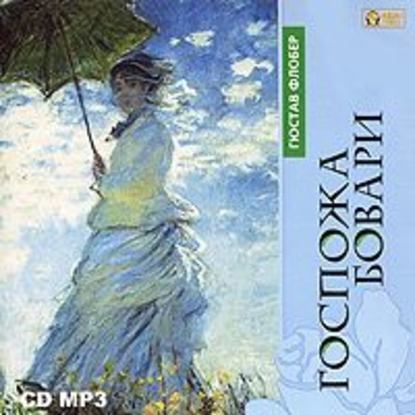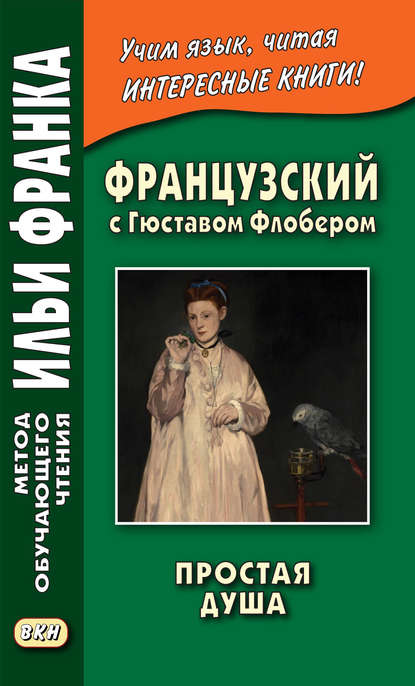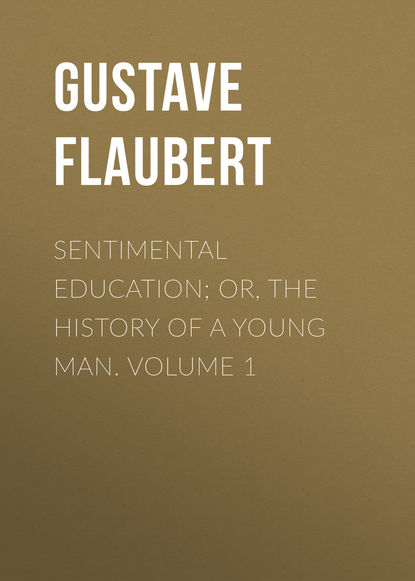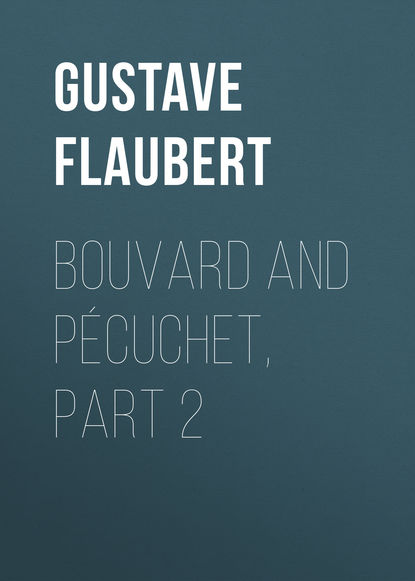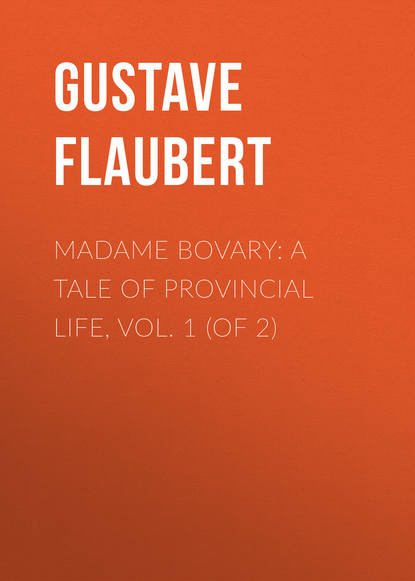
Полная версия
Madame Bovary: A Tale of Provincial Life, Vol. 1 (of 2)
He was happy then, and without a care in the world. A meal together, a walk in the evening on the highroad, a gesture of her hands over her hair, the sight of her straw hat hanging from the window-fastener, and many another thing in which Charles had never dreamed of pleasure, now made up the endless round of his happiness. In bed, in the morning, by her side, on the pillow, he watched the sunlight sinking into the down on her fair cheek, half hidden by the lappets of her nightcap. Seen thus closely, her eyes looked to him enlarged, especially when, on waking up, she opened and shut them rapidly many times. Black in the shade, dark blue in broad daylight, they had, as it were, depths of different colors, that, darker in the center, grew paler toward the surface of the eye. His own eyes lost themselves in these depths; he saw himself in miniature down to the shoulders, with his handkerchief round his head and the top of his shirt open. He rose. She came to the window to see him off, and stayed leaning on the sill between two pots of geranium, clad in her dressing-gown hanging loosely about her. Charles in the street buckled his spurs, his foot on the mounting stone, while she talked to him from above, picking with her mouth some scrap of flower or leaf that she blew out at him. Then this, eddying, floating, described semicircles in the air like a bird, and was caught before it reached the ground in the ill-groomed mane of the old white mare standing motionless at the door. Charles from horseback threw her a kiss; she answered with a nod; she shut the window, and he set off. And then along the highroad, spreading out its long ribbon of dust, along the deep lanes that the trees bent over as in arbors, along paths where the corn reached to the knees, with the sun on his back and the morning air in his nostrils, his heart full of the joys of the past night, his mind at rest, his flesh at ease, he went on, re-chewing his happiness, like those who after dinner taste again the truffles which they are digesting.
Until now what good had he had of his life? His time at school, when he remained shut up within the high walls, alone, in the midst of companions richer than he or cleverer at their work, who laughed at his accent, who jeered at his clothes, and whose mothers came to the school with cakes in their muffs? Or later, when he studied medicine, and never had his purse full enough to treat some little work-girl who would have become his mistress? Afterwards, he had lived fourteen months with the widow, whose feet in bed were cold as icicles. But now he had for life this beautiful woman whom he adored. For him the universe did not extend beyond the circumference of her petticoat, and he reproached himself with not loving her. He wanted to see her again; he turned back quickly, ran up the stairs with a beating heart. Emma, in her room, was dressing; he came up on tiptoe, kissed her back; she gave a cry.
He could not keep from continually touching her comb, her rings, her fichu; sometimes he gave her great sounding kisses with all his mouth on her cheeks, or else little kisses in a row all along her bare arm from the tip of her fingers up to her shoulder, and she put him away half-smiling, half-vexed, as you do a child who hangs about you.
Before marriage she thought herself in love; but the happiness that should have followed this love not having come, she must, she thought, have been mistaken. And Emma tried to find out what one meant exactly in life by the words felicity, passion, rapture, that had seemed to her so beautiful in books.
VI.
A Maiden's Yearnings
SHE had read "Paul and Virginia," and she had dreamed of the little bamboo-house, the nigger Domingo, the dog Fidèle, but above all the sweet friendship of some dear little brother, who seeks red fruit for you on trees taller than steeples, or who runs barefoot over the sand, bringing you a bird's nest.
When she was thirteen, her father himself took her to town to place her in the convent. They stopped at an inn in the St. Gervais quarter, where, at their supper, they used painted plates that set forth the story of Mademoiselle de la Vallière. The explanatory legends, chipped here and there by the scratching of knives, all glorified religion, the tendernesses of the heart, and the pomps of court.
Far from being bored at first at the convent, she took pleasure in the society of the good sisters who, to amuse her, took her to the chapel, which one entered from the refectory by a long corridor. She played very little during recreation hours, knew her catechism well, and it was she who always answered Monsieur le Vicaire's difficult questions. Living thus, without ever leaving the warm atmosphere of the class-rooms, and amid these pale-faced women wearing rosaries with brass crosses, she was softly lulled by the mystic languor exhaled in the perfumes of the altar, the freshness of the holy water, and the lights of the tapers. Instead of attending to mass, she looked at the pious vignettes with their azure borders in her book, and she loved the sick lamb, the sacred heart pierced with sharp arrows, or the poor Jesus sinking beneath the cross he carries. She tried, by way of mortification, to eat nothing a whole day. She puzzled her head to find some vow to fulfill.
When she went to confession, she invented little sins in order that she might stay there longer, kneeling in the shadow, her hands joined, her face against the grating beneath the whispering of the priest. The comparisons of betrothed, husband, celestial lover, and eternal marriage, that recur in sermons, stirred within her soul depths of unexpected sweetness.
In the evening, before prayers, there was some religious reading in the study. On week-nights it was some abstract of sacred history or the Lectures of the Abbé Frayssinous, and on Sundays passages from the "Génie du Christianisme," as a recreation. How she listened at first to the sonorous lamentations of its romantic melancholies re-echoing through the world and eternity! If her childhood had been spent in the shop-parlor of some business quarter, she might perhaps have opened her heart to those lyrical invasions of Nature, which usually come to us only through translation in books. But she knew the country too well; she knew the lowing of cattle, the milking, the plow. Accustomed to calm aspects of life, she turned, on the contrary, to those of excitement. She loved the sea only for the sake of its storms, and the green fields only when broken up by ruins. She wanted to get some personal profit out of things, and she rejected as useless all that did not contribute to the immediate desires of her heart, being of a temperament more sentimental than artistic, looking for emotions, not landscapes.
At the convent there was an old maid who came for a week each month to mend the linen. Patronized by the clergy, because she belonged to an ancient family of noblemen ruined by the Revolution, she dined in the refectory at the table of the good sisters, and after the meal had a bit of chat with them before going back to her work. The girls often slipped out from the study to go and see her. She knew by heart the love-songs of the last century, and sang them in a low voice as she stitched away. She told stories, gave them news, went errands in the town, and on the sly lent the big girls some novel, that she always carried in the pockets of her apron, and of which the good lady herself swallowed long chapters in the intervals of her work. They were all love, lovers, sweethearts, persecuted ladies fainting in lonely pavilions, postilions killed at every stage, horses ridden to death on every page, somber forests, heartaches, vows, sobs, tears and kisses, little skiffs by moonlight, nightingales in shady groves, "gentlemen" brave as lions, gentle as lambs, virtuous as no one ever was, always well dressed, and weeping like fountains. For six months, then, Emma, at fifteen years of age, made her hands dirty with books from old lending libraries. With Walter Scott, later on, she fell in love with historical events, dreamed of old chests, guardrooms and minstrels. She would have liked to live in some old manor-house, like those long-waisted châtelaines who, in the shade of pointed arches, spent their days leaning on the stone, chin in hand, watching a cavalier with white plume galloping on his black horse from the distant fields. At this time she had a cult for Mary Stuart and enthusiastic veneration for illustrious or unhappy women. Joan of Arc, Héloise, Agnès Sorel, the beautiful Ferronnière, and Clémence Isaure stood out to her like comets in the dark immensity of heaven, where also were seen, lost in shadow and all unconnected, St. Louis with his oak, the dying Bayard, some cruelties of Louis XI, a little of St. Bartholomew's, the plume of the Béarnais, and always the remembrance of the plates painted in honor of Louis XIV.
In the music-class, in the ballads she sang, there was nothing but little angels with golden wings, madonnas, lagunes, gondoliers; – mild compositions that allowed her to catch a glimpse athwart the obscurity of style and the weakness of the music of the attractive phantasmagoria of sentimental realities. Some of her companions brought "keepsakes" given them as New Year's gifts to the convent. These had to be hidden; it was quite an undertaking; they were read in the dormitory. Delicately handling the beautiful satin bindings, Emma looked with dazzled eyes at the names of the unknown authors, who had signed their verses for the most part as counts or viscounts.
She trembled as she blew back the tissue paper over the engraving and saw it folded in two and fall gently against the page. Here behind the balustrade of a balcony was a young man in a short cloak, holding in his arms a young girl in a white dress wearing an alms-bag at her belt; or there were nameless portraits of English ladies with fair curls, who looked at you from under their round straw hats with their large clear eyes. Some there were lounging in their carriages, gliding through parks, a greyhound bounding along in front of the equipage, driven at a trot by two small postilions in white breeches. Others, dreaming on sofas with an open letter, gazed at the moon through a slightly open window half draped by a black curtain. The naïve ones, a tear on their cheeks, were kissing doves through the bars of a Gothic cage, or, smiling, their heads on one side, were plucking the leaves of a marguerite with their taper fingers, that curved at the tips like peaked shoes. And you too were there, Sultans with long pipes, reclining beneath arbors in the arms of Bayadères; Djiaours, Turkish sabers, Greek caps; and you especially, pale landscapes of dithyrambic lands, that often show us at once palm-trees and firs, tigers on the right, a lion to the left, Tartar minarets on the horizon; the whole framed by a very neat virgin forest, and with a great perpendicular sunbeam trembling in the water, where, standing out in relief like white excoriations on a steel-grey ground, swans are swimming about.
And the shade of the argand lamp fastened to the wall above Emma's head lighted up all these pictures of the world, that passed before her one by one in the silence of the dormitory, to the distant noise of some belated carriage rolling over the Boulevards.
When her mother died she cried much the first few days. She had a funeral picture made with the hair of the deceased, and, in a letter sent to the Bertaux full of sad reflections on life, she asked to be buried some day in the same grave. The goodman thought she must be ill, and came to see her. Emma was secretly pleased that she had reached at a first attempt the rare ideal of pale lives, never attained by mediocre hearts. She let herself glide along with Lamartine meanderings, listened to harps on lakes, to all the songs of dying swans, to the falling of the leaves, the pure virgins ascending to heaven, and the voice of the Eternal discoursing down the valleys. She wearied of it, would not confess it, continued from habit, and at last was surprised to feel herself soothed, and with no more sadness at heart than wrinkles on her brow.
The good nuns, who had been so sure of her vocation, perceived with great astonishment that Mademoiselle Rouault seemed to be slipping from them. They had indeed been so lavish to her of prayers, retreats, novenas, and sermons, they had so often preached the respect due to saints and martyrs, and given so much good advice as to the modesty of the body and the salvation of her soul, that she did as tightly reined horses: she pulled up short and the bit slipped from her teeth. This nature, positive in the midst of its enthusiasms, that had loved the church for the sake of the flowers, and music for the words of the songs, and literature for its passional stimulus, rebelled against the mysteries of faith as it grew irritated by discipline, a thing antipathetic to her constitution. When her father took her from school, no one was sorry to see her go. The Lady Superior even thought that she had latterly been somewhat irreverent to the community.
Emma at home once more, first took pleasure in looking after the servants, then grew disgusted with the country and missed her convent. When Charles came to the Bertaux for the first time, she thought herself quite disillusioned, with nothing more to learn, and nothing more to feel.
But the uneasiness of her new position, or perhaps the disturbance caused by the presence of this man, had sufficed to make her believe that she at last felt that wondrous passion which, till then, like a great bird with rose-colored wings, had hung in the splendor of the skies of poesy; and now she could not think that the calm in which she lived was the happiness she had dreamed.
VII.
Disillusion
SHE thought sometimes that, after all, this was the happiest time of her life – the honeymoon, as people called it. To taste the full sweetness of it, it would have been necessary doubtless to fly to those lands with sonorous names where the days after marriage are full of laziness most suave. In post-chaises behind blue silken curtains to ride slowly up steep roads, listening to the song of the postilion re-echoed by the mountains, along with the bells of goats and the muffled sound of a waterfall; at sunset on the shores of gulfs to breathe in the perfume of lemon-trees; then in the evening on the villa-terraces above, hand in hand to look at the stars, making plans for the future. It seemed to her that certain places on earth must bring happiness, as a plant peculiar to the soil, that cannot thrive elsewhere. Why could not she lean over balconies in Swiss châlets, or enshrine her melancholy in a Scotch cottage, with a husband dressed in a black velvet coat with long tails, and thin shoes, a pointed hat and frills?
Конец ознакомительного фрагмента.
Текст предоставлен ООО «ЛитРес».
Прочитайте эту книгу целиком, купив полную легальную версию на ЛитРес.
Безопасно оплатить книгу можно банковской картой Visa, MasterCard, Maestro, со счета мобильного телефона, с платежного терминала, в салоне МТС или Связной, через PayPal, WebMoney, Яндекс.Деньги, QIWI Кошелек, бонусными картами или другим удобным Вам способом.
1
A mixture of coffee and spirits. – Trans.







